
German postcard by Rotophot in the Film Sterne series, no. 514/2. Photo: Fern Andra Atelier. Fern Andra in Der Seele Saiten schwingen nicht (n.n., 1916-1917). In an accident at work, Fern falls off the ladder and injures her right arm so badly that she can never paint again. How should she feed her son in the future?
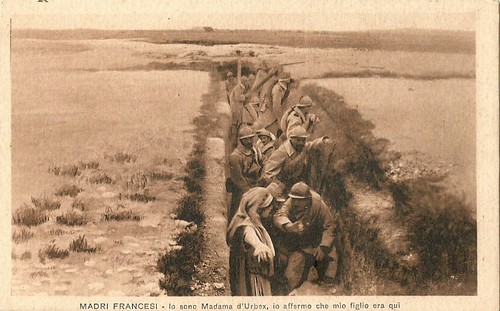
Italian postcard. Sarah Bernhardt as Mme D'Urbex in the French war propaganda film Mères françaises/French Mothers (René Hervil, Louis Mercanton, 1917). Caption: I am Mme D'Urbex, I confirm my son was here.

Spanish collectors card by Chocolate Pi, Barcelona, no. 3 (of 6). Photo: Gaumont. Yvette Andreyor as Solange in La déserteuse (Louis Feuillade, 1917). The Spanish release title was Tortura de madre. After 10 years, Solange is overjoyed to meet her daughter again, and substitutes as governess to Lucille, but the joy is cut short when the arrival of her ex is announced - so she disappears again in the dark.

German postcard by Rotophot in the Film Sterne series, no. 557/2. Photo: Fern Andra Atelier. Fern Andra in Drohende Wolken am Firmament/Threatening clouds in the sky (Fern Andra, 1918), scripted by Fern Andra. A dramatic development in Fern's and Alfred Abel's marriage crisis finds its redemption only when their child is in dire straits.

Italian postcard. Photo: Milano Film. Ines Cristina-Zacconi as Helene and Ermete Zacconi's son Peppino as Helen's son Osvaldo in the Italian silent film Spettri/Gli spettri (A.G. Caldiera, 1918), adapted from Henrik Ibsen's 'Ghosts' (Gengangere, 1881). Caption: Osvaldo, Osvaldo, what is the matter with you?
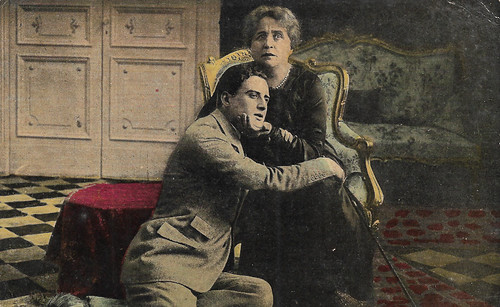
Spanish collectors card by Chocolat Imperial, cromos no. 6 of 6. Photo: Grandes Exclusivas Verdaguer / FAI. Ida Carloni Talli as Fausto's mother and Giovanni Schettini as Fausto in the Italian silent drama Vertigine/Vertigo (Baldassarre Negroni, 1919). The Spanish title is El Vertigo. Fausto's mother suspects something is going on, but also Enzo notices Marisa is not herself. She finally admits Fausto has declared her his love. Enzo, blind of rage, reacts to Fausto, who admits his guilt and offers his life. Enzo instead forces Fausto to reveal his mother the truth. Fausto cannot cope with so much disgrace to his mother, so he commits suicide.

German postcard by Ross Verlag, Berlin, no. 311/2, 1919-1924. Photo: Wasow, München (Munich). Caption: Erna Morena and her child.

Italian postcard by G. B. Falci, Milano, no. 117. Soava Gallone and Marcella Sabbatini in the silent film All'ombra di un trono/In the Shadow of a Throne (Carmine Gallone, 1921). The film was based on a novel by Charles Folly, 'Fleur d'ombre'. The renouncement of (but then revocation) of real love, the court intrigues, and a final duel are the ingredients of this Ruritania-like story.
Pampering mother
In families who celebrate Mother's Day, the day is all about pampering mother. She often gets breakfast in bed and gifts. She is exempted from household tasks. Sometimes the younger children have made gifts at school or nursery.
Mother worship is a much older tradition than modern Mother's Day and goes back to the Mother cult in Classical Greece. There it was not so much the ordinary mothers that were put in the limelight, but Rhea, the mother of the gods, was honored. The Catholic Church has a long tradition of worshiping Mary, the mother of Jesus.
It wasn't until the mid-1800s that Mother's Day was introduced to America. In 1870, Judge Julia Ward Howe of Philadelphia launched a major publicity campaign for Mother's Day, a day devoted to pacifism and women's disarmament.
However, success came only after Anna Marie Jarvis (1864-1948) of Grafton, West Virginia, began promoting Mother's Day in 1907 as a day of appreciation for mothers. In 1908 she organized the first Mother's Day, mainly to commemorate her mother Ann Reeves Jarvis, who had organized Mother's Day Work Clubs during the American Civil War to provide food and medicine for needy mothers.
The idea caught on, and Jarvis persisted in persuading more people. In 1914, President Woodrow Wilson decided that every second Sunday in May would henceforth be Mother's Day, a national holiday.

Italian postcard by Ed. Ballerini & Fratini, Firenze, no. 248. Photo: Italia Almirante Manzini and Alberto Collo in L'ombra/The Shadow (Mario Almirante, 1923). Caption: Berta: Poor little one! He won't realize to have changed his mother. This image represents the final scene of the film.
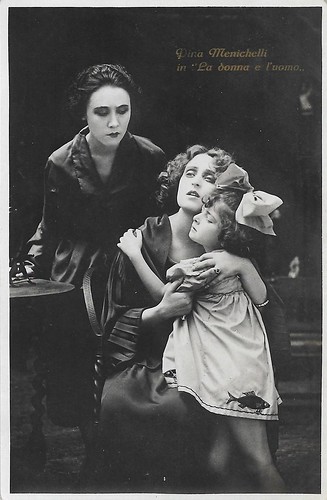
Italian postcard by G.B. Falci, Milano. Photo: Fotominio. Pina Menichelli and Marcella Sabbatini in La donna e l'uomo (Amleto Palermi, 1923).Young Gilian (Menichelli) has married the egoist and unworthy Philip O'Mara (Milton Rosmer), who after having reduced her to misery, abandons her and her daughter, little Dora (Sabbatini), and leaves for Australia.

German postcard by Ross Verlag, Berlin, no. 667/2. Photo: Neumann. Grigori Chmara aka Gregor Chmara as Jesus Christ and Henny Porten as Mary in the Biblical film I.N.R.I. (Robert Wiene, 1923).

German postcard by Ross Verlag no. 682/5. Photo: FFG (Froehlich-Film GmbH). Henny Porten in Mutter und Kind/Mother and Child (Carl Froehlich 1924). She became the quintessence of German womanhood, who often played suffering and self-sacrificing mothers.

German postcard by Ross Verlag, no. 133/12. Photo: Metro-Goldwyn-Mayer. Ramon Novarro as Ben-Hur, May McAvoy as his sister Esther, and Claire McDowell as his mother in the final scene of Ben-Hur (Fred Niblo, 1925).
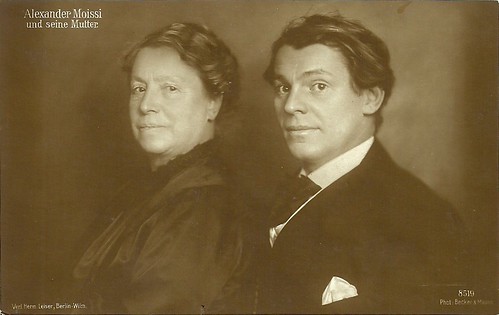
German postcard by Verlag Hermann Leiser, Berlin-Wilm., no 8519. Photo: Becker & Maass.
Albanian-Austrian Alexander Moissi (1879-1935) was one of the great European stage actors of the early-20th century. The attractive and charismatic women's idol also appeared in several silent and early sound films.

German postcard by Ross Verlag, no. 112/2. Photo: Atelier Schmoll, Berlin / Henny Porten-Film Produktion. Henny Porten and Inge Landgut in Mutterliebe/A Mother's Love (Georg Jacoby, 1929).
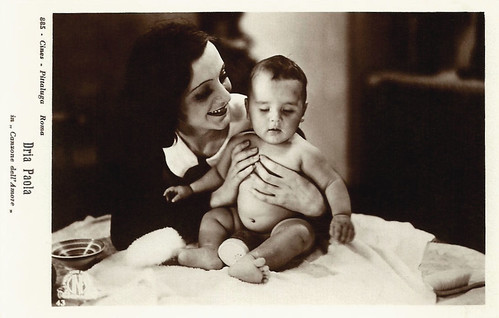
Italian postcard by G.B. Falci, Milano, no. 885. Photo: Cines Pittaluga Roma. Dria Paola as Lucia in La canzone dell’amore/The Song of Love (Gennaro Righelli, 1930). While her widowed mother dies giving birth, music student Lucia adopts little Ninni, pretending to her fiancé Enrico and her landlady it is her own child.

Dutch postcard by the Rialto Theatre, Amsterdam, 1934. Photo: Remaco Radio Picture. Katharine Hepburn, Joan Bennett, Frances Dee, Jean Parker, and Spring Byington as their mother in Little Women (George Cukor, 1933). The Dutch title of the film and the book by Louise M. Alcott is Onder moeders vleugels (Under mother's wings).

Belgian postcard. Photo: publicity still for La porteuse de pain/The Bread Peddler (René Sti, 1934) with Germaine Dermoz and Jacques Grétillat. Here Germaine Dermoz's character Jeanne embraces her daughter Louise, played by Simone Bourday. The daughter apparently hasn't recognized her mother yet. Card for the Ghent cinema Rex. Caption: Mother Lison, I am so lonely and unhappy, without a mother.

Dutch postcard, no. 264. Photo: Fox Film. Mae Marsh and her daughter Mary.
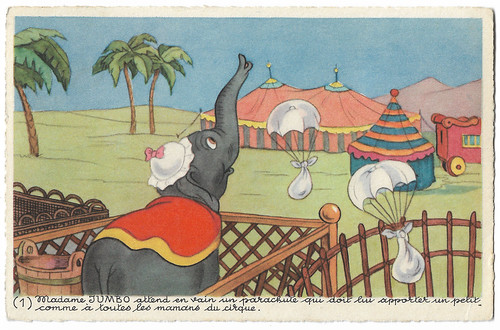
French postcard by Éditions Superluxe, Paris, no. 1. Image: Walt Disney - Mickey-Mouse, S.A. Publicity still for Dumbo (Ben Sharpsteen, a.o., 1941). Caption: Mrs. Jumbo waits in vain for a parachute which should bring her a little one like all the mothers of the circus.

Italian postcard by TV film. Sophia Loren and Eleonora Brown as her daughter in La ciociara/Two Women (Vittorio De Sica, 1960). La Loren won the Oscar for her mother role in this film.

German postcard by Modern Times. Photo: Interfoto. Caption: Alles schlampen, ausser mama (All bitches, except mama).
Dutch singer and actor Hein Simons (1955) was a famous child star in the 1960s under the name Heintje. He sang in Dutch, English, German, Japanese, and Afrikaans, and he sold more than 40 million records worldwide. His greatest hit was Mama. Between 1968 and 1971 he also starred in six German light entertainment films, of which one became surprisingly popular in Red China.

American or British publicity still. Photo: Warner. Ingrid Thulin as Sophie Essenbeck and Helmut Berger as Martin Essenbeck in The Damned/ La caduta degli dei (Luchino Visconti, 1969). Sophie is the ambitious, scheming and possessive mother. In the end, her son Martin humiliates his mother and eventually even rapes her.
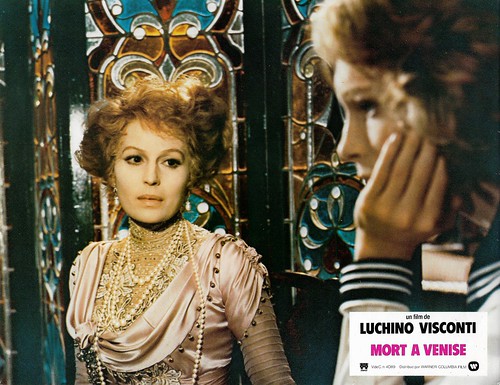
French publicity leaflet. Silvana Mangano and Björn Andresen in Death in Venice/Morte a Venezia/Mort à Venise (Luchino Visconti, 1971), starring Dirk Bogarde. Silvana Mangano is the ethereal beauty, inspired by Visconti's own mother. Dress designed by Piero Tosi.
Source: Wikipedia (English and Dutch).
2 comments:
One of your best posts to date!
Great. Thank you, Maria!
Post a Comment